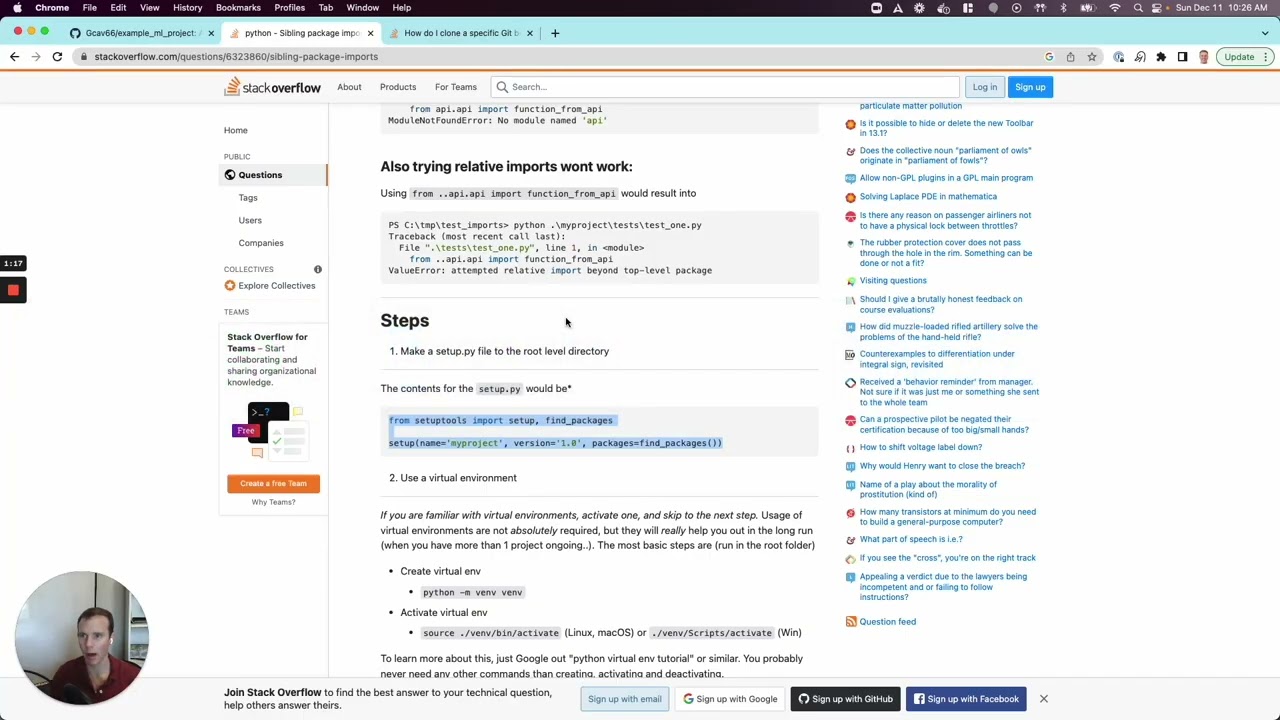How to solve ModuleNotFoundError: No module named ‘gitdb’ error in python

Understanding the ModuleNotFoundError
The ModuleNotFoundError is a common issue in Python programming, particularly when working with packages and libraries that are not installed in your environment. It occurs when the Python interpreter cannot locate a specified module. One frequent instance of this error is when attempting to import the gitdb module. This error message clearly states: No module named ‘gitdb’, prompting programmers to find a solution.
What Causes the ModuleNotFoundError?
There are several reasons why you might encounter this error:
- The module is not installed in your current Python environment.
- The installation path is not correctly set, causing Python not to find the library.
- Version compatibility issues may arise if the module you are trying to use is no longer supported.
- Virtual environments may lead to this error if the module is installed in a different environment.
Checking Your Python Environment
Before diving into fixing the issue, it is crucial to understand your Python environment. You might have multiple versions of Python installed. To check which version you’re currently using, execute the following command in your terminal:
python --versionThis command will display the current version of Python. If you’re using a virtual environment, make sure you’re running the interpreter associated with that environment. To do this, check the path with:
which pythonIdentifying Installed Modules
To see if gitdb is installed, run:
pip listIf gitdb is not listed, you will need to install it. If you happen to see it in your list, check for potential version mismatches that may necessitate reinstallation.
Installing the gitdb Module
If after checking, you find that the gitdb module is not installed, you can easily install it via pip. Here’s how to do it:
pip install gitdbThis command will download and install gitdb from the Python Package Index (PyPI). It’s important to ensure that your terminal is directed towards the correct environment where your project is running. If you face permissions errors, consider adding –user to the command:
pip install --user gitdbVerifying the Installation
After the installation is complete, it’s prudent to verify that the module is indeed installed correctly. You can do this using the following command:
pip show gitdbThis command provides detailed information about the installed gitdb package, including its version and location.
Troubleshooting Common Issues
There are various issues that might prevent you from successfully importing the gitdb module even after installing it. Here are some common troubleshooting steps:
1. Check Your PYTHONPATH
Your PYTHONPATH environment variable tells Python where to look for modules. If gitdb is installed in a directory that’s not included in this path, you’ll encounter the error. You can check your PYTHONPATH by running:
echo $PYTHONPATH2. Use a Virtual Environment
If you are not using a virtual environment, consider setting one up. Virtual environments can help manage dependencies and avoid conflicts. You can create a virtual environment using:
python -m venv myenvActivate it with:
source myenv/bin/activateThen, within this environment, install gitdb as previously explained.
3. Update pip
Sometimes, your version of pip may be outdated, leading to issues when trying to install packages. Update pip using:
pip install --upgrade pipExploring Alternatives
If after these steps you’re still encountering difficulties, you may consider looking for alternatives. Here are a few packages that provide similar functionalities to gitdb:
- GitPython: A Python library used for interacting with Git repositories.
- dulwich: A pure Python implementation of the Git file formats and protocols.
- pygit2: A set of Python bindings for libgit2.
These alternatives may serve your needs without requiring the gitdb module.
Further Resources and Documentation
To deepen your understanding of working with Python modules and resolving ModuleNotFoundError, refer to the following resources:
These resources will guide you through resolving not only the gitdb module error, but also enhance your Python programming skills regarding modules and package management.
Best Practices for Managing Python Libraries
Understanding how to manage Python libraries effectively can save you a lot of time and headaches in the long run. Here are some best practices to follow:
- Always use virtual environments to avoid conflicts between dependencies across different projects.
- Keep your pip and Python versions updated to ensure compatibility and access to the latest features.
- Document your dependencies in a requirements.txt file, making it easier to replicate your environment in the future.
- Regularly review and remove unnecessary packages to keep your environment clean and efficient.





